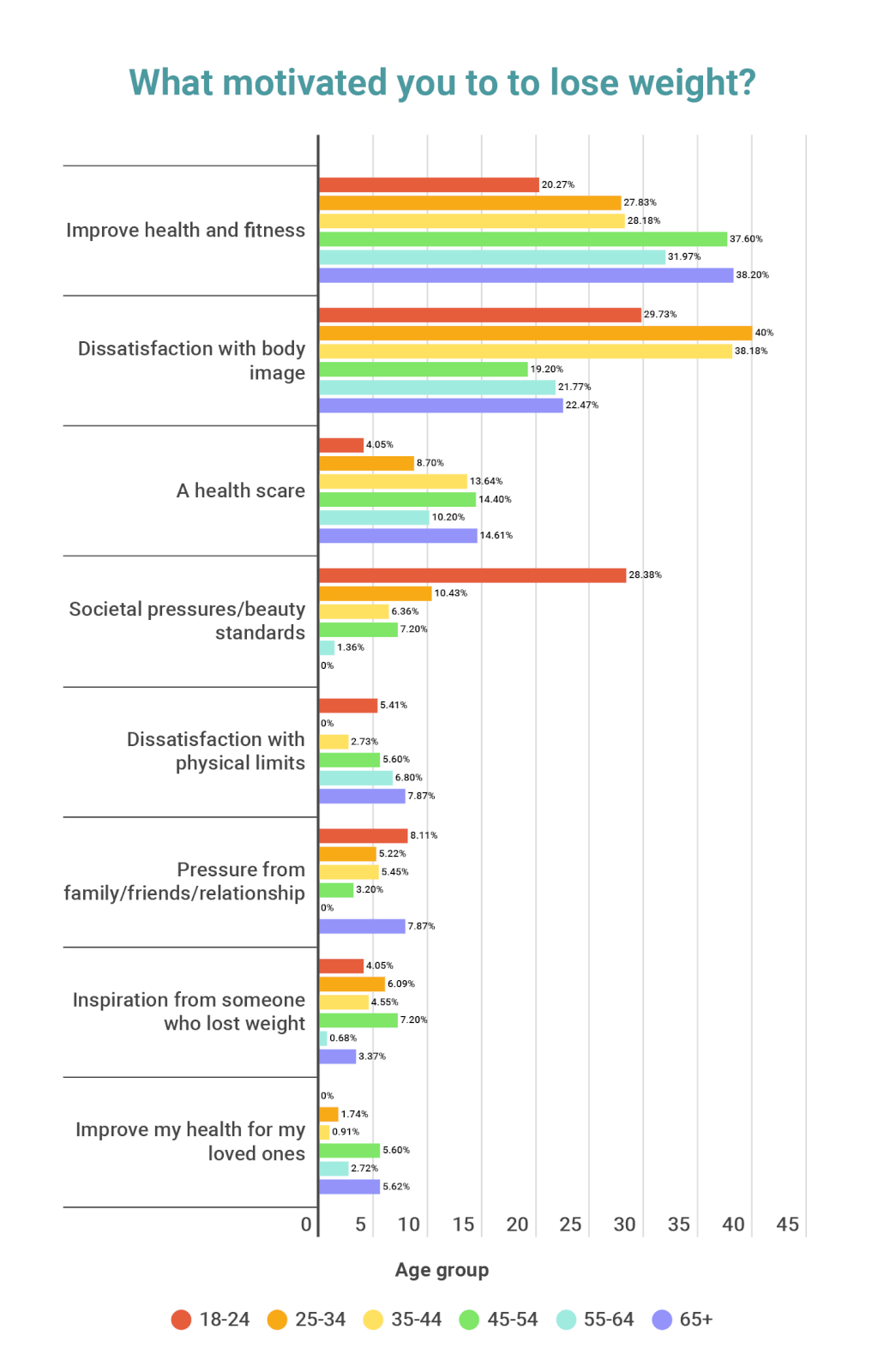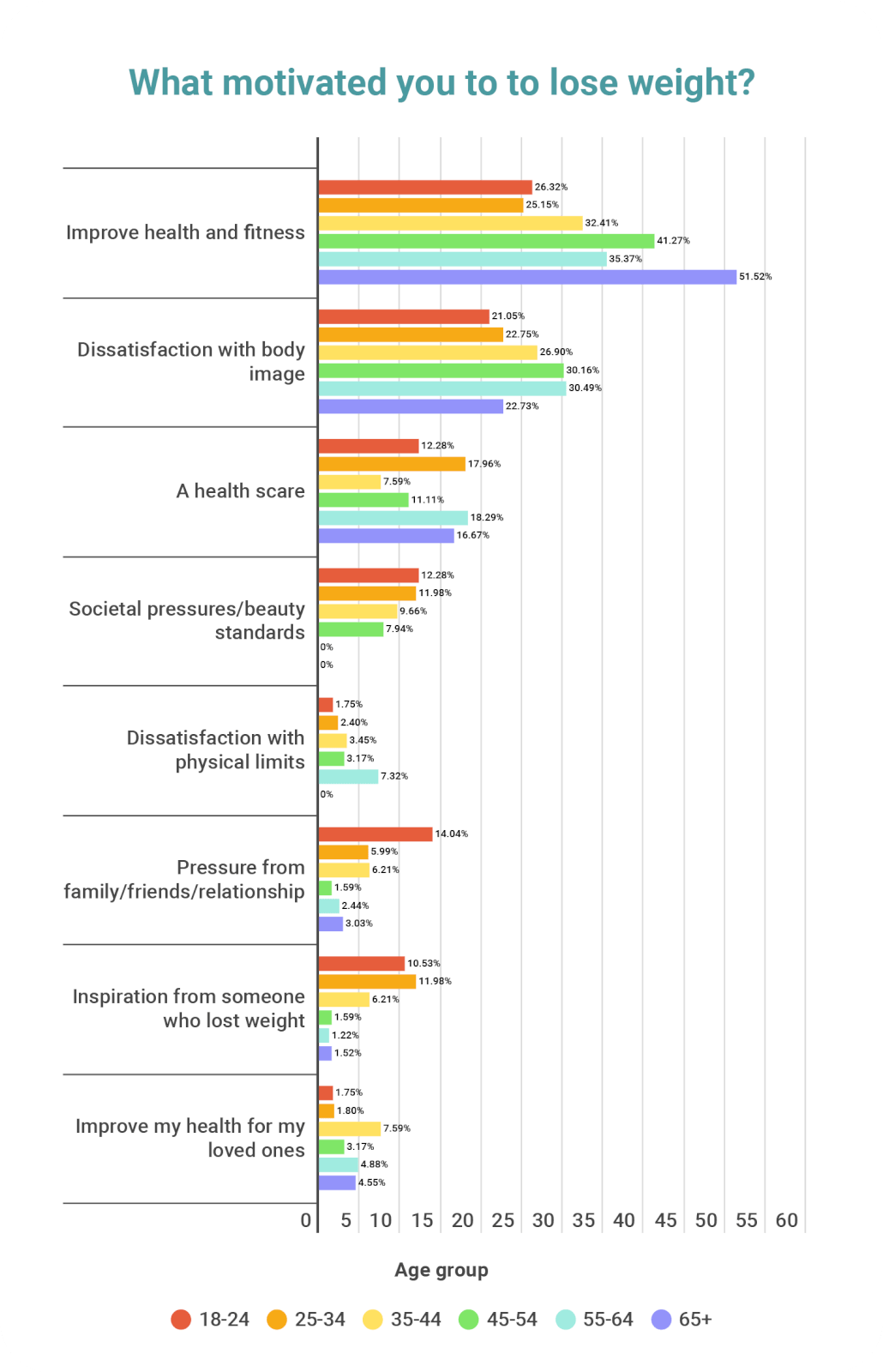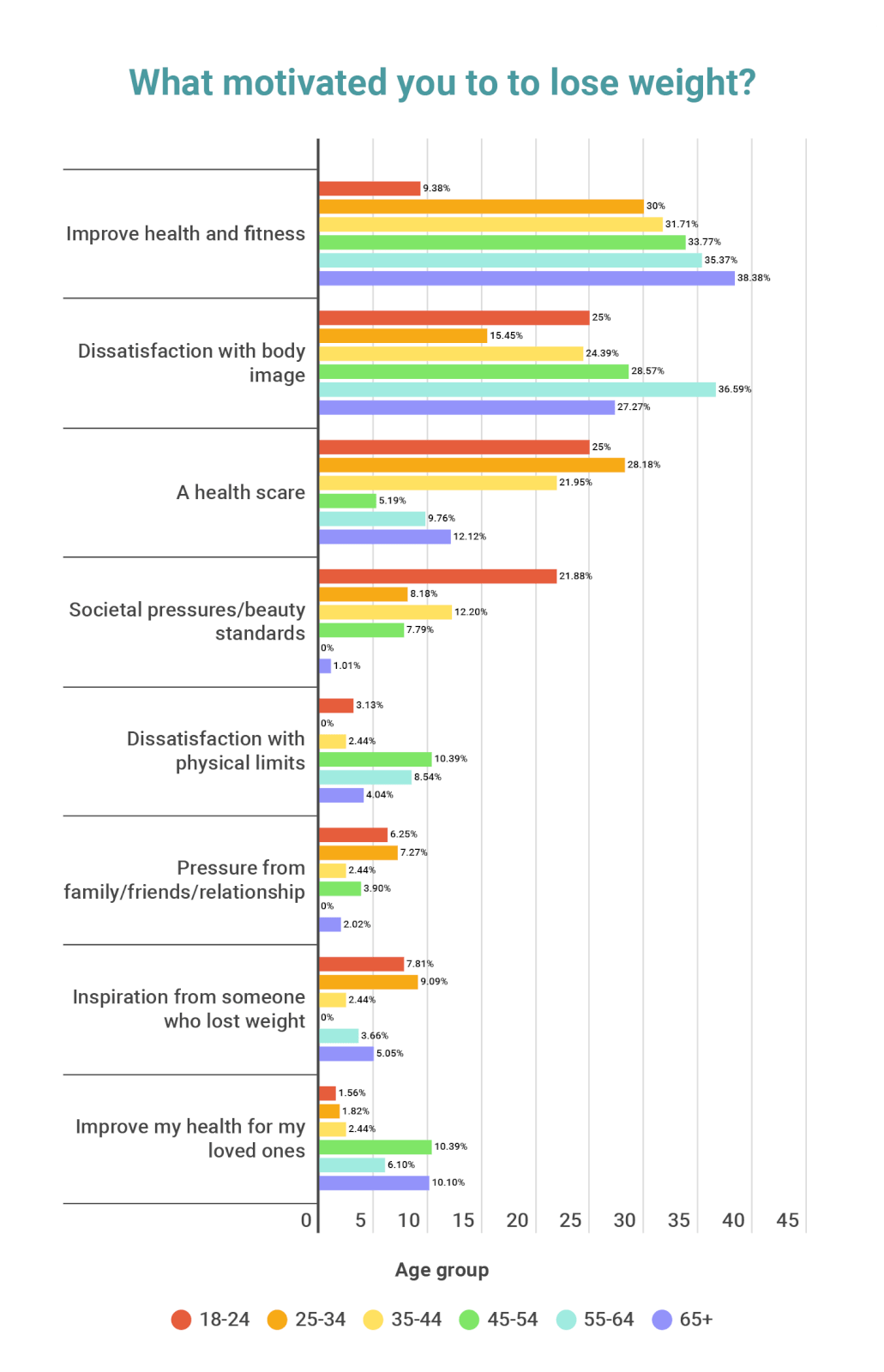The Burrow
There are many reasons why people might want to lose weight: improved fitness, dissatisfaction with their looks, a health scare, societal expectations, and the list goes on. People might want to lose weight at any age, and they may choose to diet or exercise (or both) to achieve their goals.
To get a better understanding of what motivates people to start losing weight and how they begin their journey, the health insurance experts at Compare the Market surveyed more than 3,000 adults from Australia, Canada and the USA to find out.
Across all three nations surveyed, most people had, at some point in their life, began a journey to lose weight. Australia had the highest number of respondents attempting to shed some kilos, with 62.2% of Australians working to lose weight. In Canada it was 57.5% of respondents who tried the same, while the US cohort showed an almost even split with 50.9% of Americans going on a weight loss plan.
Shockingly, the vast majority of those who have embarked on a journey to lose weight across all countries surveyed did so without first consulting a medical professional. This number was again highest in Australia with more than three-in-four (75.3%) choosing not to talk to a health professional beforehand. In North America, it was 68.8% for Canada and 63% for the USA.
Compare the Market’s Head of Health Insurance, Lana Hambilton, says these numbers can be cause for concern.
“The fact that so many people don’t talk to their doctor or a health professional before deciding to lose weight is worrisome. Doing so is important, as it means you can receive sound medical advice, which can help you with a plan or regime that is tailored to your specific needs. This will help you get the most out of your weight loss journey,” says Hambilton.
Compare the Market’s survey asked respondents if they ever had to stop losing weight due to concerns their weight loss regimen was actually adversely affecting their health.
Canada had the highest proportion of adults who needed to stop their journey because of how it was negatively affecting them, with almost a third doing so (32.8%). America had a slightly lower percentage with 28.4%, and Australia the lowest at 18.4%, or just less than one-in-five.
Talking to a doctor isn’t just beneficial for setting yourself up for a positive weight loss journey, but it is crucial to accessing some of the benefits of private health insurance for weight loss related services. As Hambilton explains:
“In Australia, private health insurance can contribute towards the costs of dietetics appointments and health management programs. Some policies will even pay a benefit towards gym memberships by getting sign-off from your doctor.”
“What you can claim on will depend on whether you hold hospital, extras or combined cover and the inclusions on your policy. In Australia, some Gold hospital insurance policies can cover things like gastric sleeve or gastric bypass surgery, if your doctor believes they are medically necessary. An extras policy can cover things like gym memberships, weight management programs and consultations with a dietitian”
Hambilton adds, “having private health insurance gives you more options, helps you avoid public waiting lists and gives you the freedom to choose your doctor.”
When considering habits by gender, it was revealed that women in all three countries were much more likely to have started on a path to lose weight than men. This was highest in Australia with 74.5% of women, followed by 66.3% in Canada and 57.9% in the USA.
In fact, Australia was the only country where there were more men who had gone on a journey to lose weight (52.5%) than there were men who hadn’t. In North America, more men were likely to have never tried to lose weight (51.8% in Canada and 55.9% in the USA).
When the data was broken down by age, there was another key difference between Australia and their North American counterparts. In Australia, the majority of people in all age groups had embarked on a weight loss journey at some point, except for those aged 65 and above. In Canada and the USA, losing weight was more common among the young.
Canadians aged 18-44 had the biggest inclination to shed a few kilos. Those aged 55-64 were slightly more likely to say they have gone on a weight loss journey as well, but those aged 45-54 and 65 and above were not. In the USA, only those aged 18-34 were more inclined to shed weight as opposed to not. It was a 50-50 split for 35–44-year-olds, while all other age groups were more likely to not have.
There are numerous reasons why people would want to start losing weight. The top three reasons were the same for all three nations surveyed, which were:
| Key weight loss motivations | Australia | Canada | USA |
| Personal drive to improve health/physical fitness (not influenced by a health scare) | 33.0% | 33.3% | 30.7% |
| Personal dissatisfaction with body image | 29.8% | 25.5% | 25.7% |
| A health scare | 11.9% | 14.0% | 17.3% |
| Societal pressures/beauty standards | 8.2% | 7.9% | 7.8% |
| Dissatisfaction with physical limitations | 5.0% | 3.1% | 4.5% |
| Pressure from family/friends/relationship | 4.6% | 5.5% | 3.7% |
| Inspiration from someone who had great success with weight loss | 4.5% | 6.6% | 4.9% |
| Drive to improve physical health for the benefit of loved ones | 3.0% | 4.1% | 5.4% |
When motivations were broken down by gender, women were much more likely than men to be motivated by body image as well as societal pressures and beauty standards, and this was true for all three countries. On the other hand, men were more likely than women to be motivated by a health scare and the desire to improve their health and fitness.
| Motivation for weight loss | Australian women | Australian men | Canadian women | Canadian men | American women | American men |
| Improve health and fitness | 30.14% | 37.35% | 32.84% | 34.60% | 26.39% | 36.28% |
| Dissatisfaction with body image | 36.71% | 19.84% | 29.29% | 20.25% | 32.99% | 16.37% |
| A health scare | 8.49% | 16.73% | 12.43% | 16.46% | 13.89% | 21.68% |
| Societal pressures/beauty standards | 10.41% | 5.06% | 10.65% | 3.80% | 9.38% | 5.75% |
| Dissatisfaction with physical limits | 2.74% | 8.17% | 2.37% | 4.22% | 6.25% | 2.21% |
| Pressure from family/friends/relationship | 5.21% | 3.50% | 5.03% | 5.49% | 3.82% | 3.54% |
| Inspiration from someone who lost weight | 4.38% | 4.67% | 3.85% | 10.13% | 2.43% | 7.96% |
| Improve my health for my loved ones | 1.92% | 4.67% | 3.55% | 5.06% | 4.86% | 6.19% |
From the survey, it’s clear that people want to work on their own health and fitness, but it’s also evident that weight is also strongly tied to beauty and body image, which remains a highly gendered issue.
Societal expectations and beauty standards also seem to affect the younger generations more so than any other age group. When the data is broken up by age group, over one-in-five Americans and over one-in-four Australians aged 18-25 said societal pressures and beauty standards were their main motivation for losing weight.
Interestingly, in Canada societal beauty standards was much less of a motivator for 18–25-year-olds. Personal dissatisfaction with body image, which was the second-most common reason behind losing weight overall, affected different age groups differently across the three countries.
In Australia, 40% of those aged 25-34 listed this as their main reason for shedding the kilos. In Canada and the USA, it was those aged 55 to 64 who were the most likely to say body image dissatisfaction inspired them to lose weight (30.5% and 36.6% respectively).



When asked what methods people used to lose weight, the most common response was a self-planned diet, which accounted for more than 50% of all survey respondents who went on a weight loss journey – for every country surveyed.
This was highest in Australia, where 55.4% of respondents said they planned a diet themselves. The US had the next-highest response with 50.4%, followed closely by Canada at 50%.
In comparison, the second-most popular weight loss method amongst Australians and Canadians was a self-planned exercise regime, with 42.5% and 42.8% of respondents saying they worked out to lose weight. In contrast, this was the third-most popular option in the USA (37.7%), coming in behind following a specific diet (41.2%).
| Preferred methods of weight loss | Australia | Canada | USA |
| Self-planned diet | 55.4% | 50.0% | 50.4% |
| Self-planned exercise regime | 42.5% | 42.8% | 37.7% |
| Following a specific type of diet | 32.5% | 41.2% | 41.2% |
| Following a specific exercise regime | 23.6% | 29.5% | 27.2% |
| Other | 5.6% | 3.3% | 6.2% |
“It interesting to see that the most popular weight loss methods in Australia and Canada were self-planned, rather than a pre-set diet or exercise regime,” Hambilton says. “This strong self-drive is commendable, and can be key to maintaining weight loss over time.”
“It’s generally understood that diet and exercise are key to losing weight, but I really want to encourage anyone wishing to embark on a weight loss journey to consult with health professionals first, so that you’re set up with the best possible start for your body’s needs.”
